Tesco's Operating Environment: A PESTLE Analysis of Key Changes
VerifiedAdded on 2023/01/18
|6
|800
|94
Report
AI Summary
This report provides a PESTLE analysis of Tesco, a UK-based retail firm, to understand its global business environment. It examines political factors like Brexit's impact on prices and supply chains, economic factors such as employment levels and exchange rate fluctuations, and social factors like changing consumer spending habits. Technological advancements, legal compliance, and environmental policies are also analyzed. The report concludes that firms must carefully assess the environment in which they operate to avoid potential losses. The analysis considers how Brexit affects sourcing, labor, and trade deals, as well as the influence of employment rates and exchange rates on Tesco's operations. Social factors explore consumer behavior shifts, while technological elements cover self-checkout and data utilization. Legal compliance ensures adherence to regulations, and environmental policies focus on sustainability.
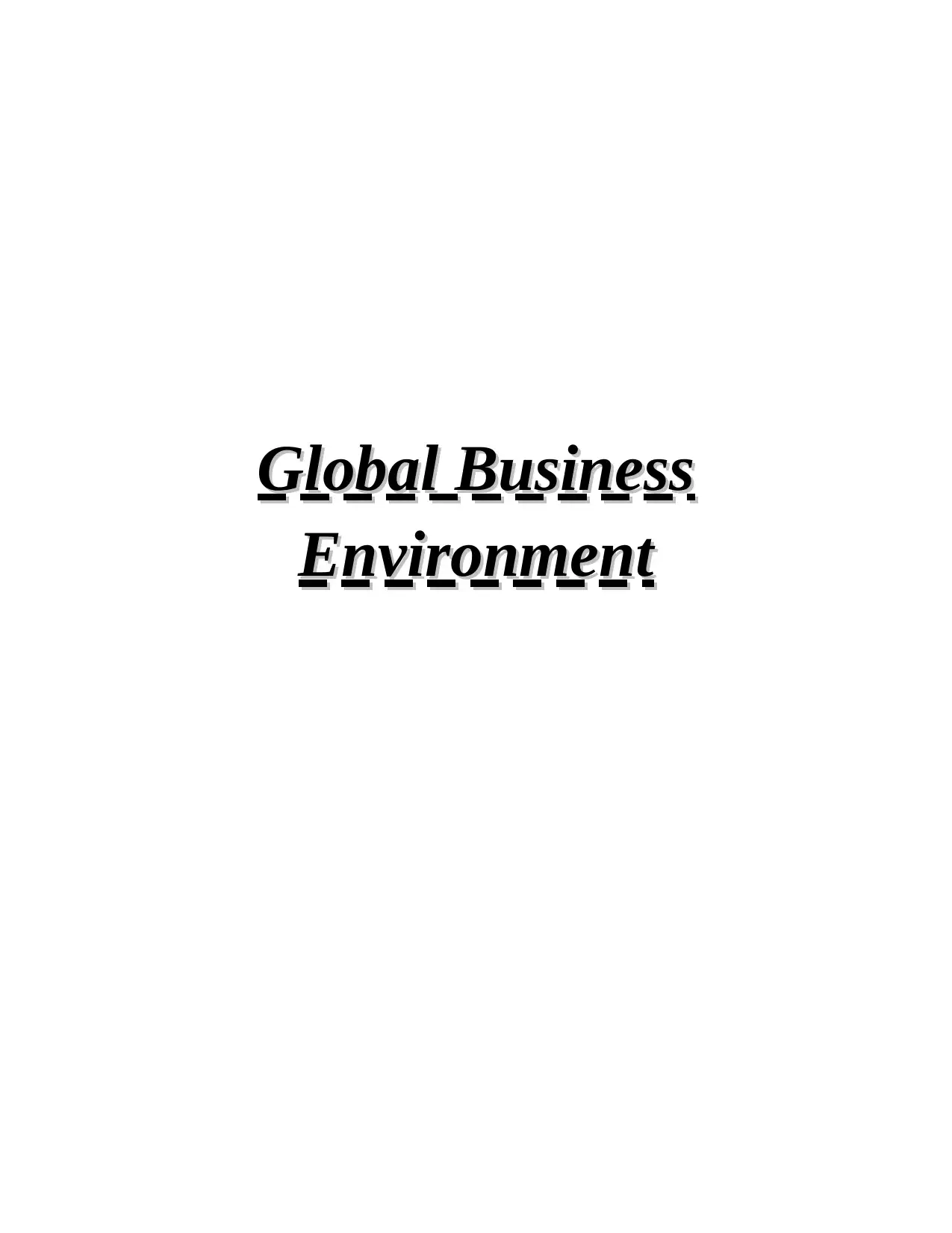
Global BusinessGlobal Business
EnvironmentEnvironment
EnvironmentEnvironment
Paraphrase This Document
Need a fresh take? Get an instant paraphrase of this document with our AI Paraphraser
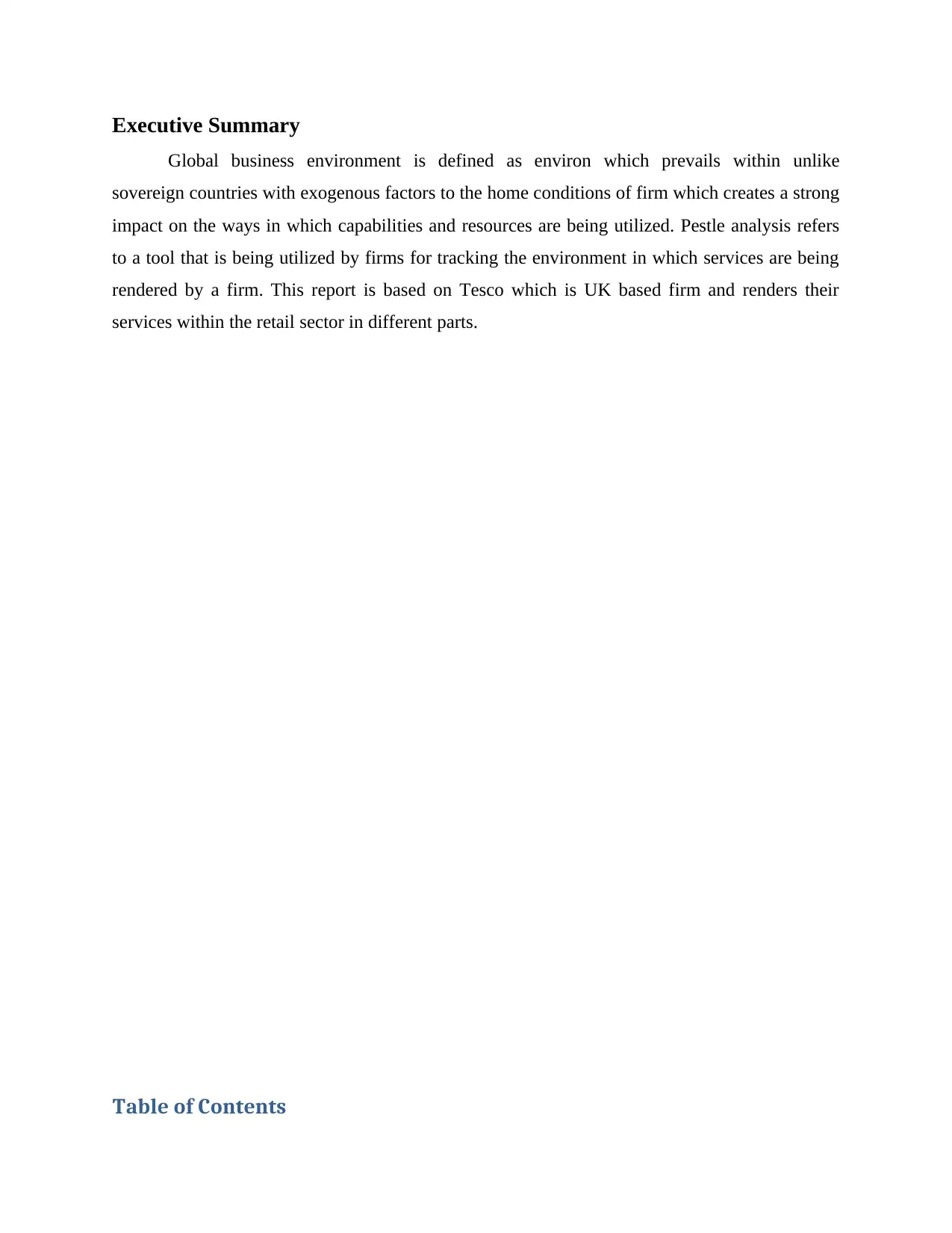
Executive Summary
Global business environment is defined as environ which prevails within unlike
sovereign countries with exogenous factors to the home conditions of firm which creates a strong
impact on the ways in which capabilities and resources are being utilized. Pestle analysis refers
to a tool that is being utilized by firms for tracking the environment in which services are being
rendered by a firm. This report is based on Tesco which is UK based firm and renders their
services within the retail sector in different parts.
Table of Contents
Global business environment is defined as environ which prevails within unlike
sovereign countries with exogenous factors to the home conditions of firm which creates a strong
impact on the ways in which capabilities and resources are being utilized. Pestle analysis refers
to a tool that is being utilized by firms for tracking the environment in which services are being
rendered by a firm. This report is based on Tesco which is UK based firm and renders their
services within the retail sector in different parts.
Table of Contents

Executive Summary.....................................................................................................................................2
Introduction.................................................................................................................................................4
Pestle analysis..........................................................................................................................................4
Conclusion...................................................................................................................................................5
References...................................................................................................................................................6
Introduction.................................................................................................................................................4
Pestle analysis..........................................................................................................................................4
Conclusion...................................................................................................................................................5
References...................................................................................................................................................6
⊘ This is a preview!⊘
Do you want full access?
Subscribe today to unlock all pages.

Trusted by 1+ million students worldwide
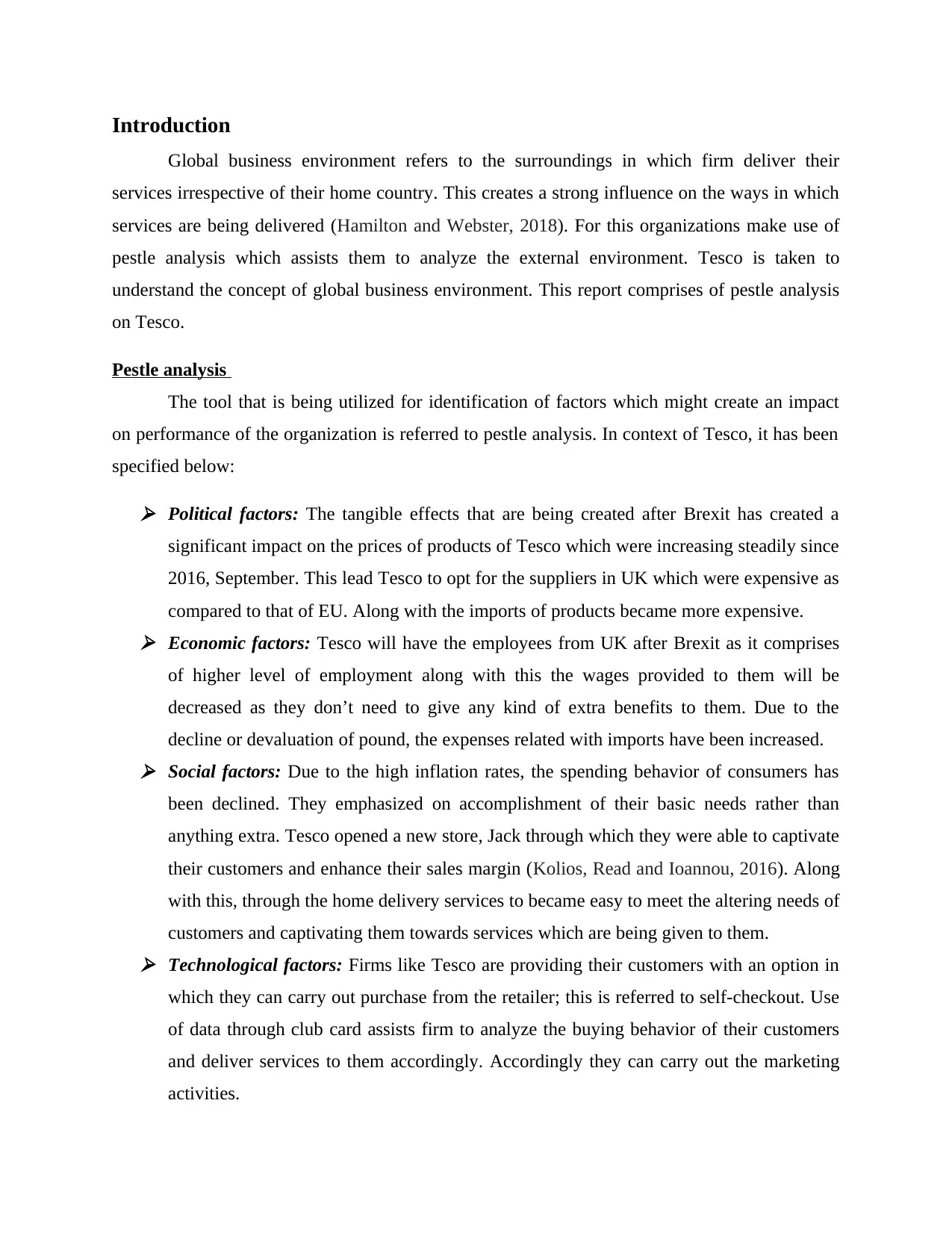
Introduction
Global business environment refers to the surroundings in which firm deliver their
services irrespective of their home country. This creates a strong influence on the ways in which
services are being delivered (Hamilton and Webster, 2018). For this organizations make use of
pestle analysis which assists them to analyze the external environment. Tesco is taken to
understand the concept of global business environment. This report comprises of pestle analysis
on Tesco.
Pestle analysis
The tool that is being utilized for identification of factors which might create an impact
on performance of the organization is referred to pestle analysis. In context of Tesco, it has been
specified below:
Political factors: The tangible effects that are being created after Brexit has created a
significant impact on the prices of products of Tesco which were increasing steadily since
2016, September. This lead Tesco to opt for the suppliers in UK which were expensive as
compared to that of EU. Along with the imports of products became more expensive. Economic factors: Tesco will have the employees from UK after Brexit as it comprises
of higher level of employment along with this the wages provided to them will be
decreased as they don’t need to give any kind of extra benefits to them. Due to the
decline or devaluation of pound, the expenses related with imports have been increased. Social factors: Due to the high inflation rates, the spending behavior of consumers has
been declined. They emphasized on accomplishment of their basic needs rather than
anything extra. Tesco opened a new store, Jack through which they were able to captivate
their customers and enhance their sales margin (Kolios, Read and Ioannou, 2016). Along
with this, through the home delivery services to became easy to meet the altering needs of
customers and captivating them towards services which are being given to them. Technological factors: Firms like Tesco are providing their customers with an option in
which they can carry out purchase from the retailer; this is referred to self-checkout. Use
of data through club card assists firm to analyze the buying behavior of their customers
and deliver services to them accordingly. Accordingly they can carry out the marketing
activities.
Global business environment refers to the surroundings in which firm deliver their
services irrespective of their home country. This creates a strong influence on the ways in which
services are being delivered (Hamilton and Webster, 2018). For this organizations make use of
pestle analysis which assists them to analyze the external environment. Tesco is taken to
understand the concept of global business environment. This report comprises of pestle analysis
on Tesco.
Pestle analysis
The tool that is being utilized for identification of factors which might create an impact
on performance of the organization is referred to pestle analysis. In context of Tesco, it has been
specified below:
Political factors: The tangible effects that are being created after Brexit has created a
significant impact on the prices of products of Tesco which were increasing steadily since
2016, September. This lead Tesco to opt for the suppliers in UK which were expensive as
compared to that of EU. Along with the imports of products became more expensive. Economic factors: Tesco will have the employees from UK after Brexit as it comprises
of higher level of employment along with this the wages provided to them will be
decreased as they don’t need to give any kind of extra benefits to them. Due to the
decline or devaluation of pound, the expenses related with imports have been increased. Social factors: Due to the high inflation rates, the spending behavior of consumers has
been declined. They emphasized on accomplishment of their basic needs rather than
anything extra. Tesco opened a new store, Jack through which they were able to captivate
their customers and enhance their sales margin (Kolios, Read and Ioannou, 2016). Along
with this, through the home delivery services to became easy to meet the altering needs of
customers and captivating them towards services which are being given to them. Technological factors: Firms like Tesco are providing their customers with an option in
which they can carry out purchase from the retailer; this is referred to self-checkout. Use
of data through club card assists firm to analyze the buying behavior of their customers
and deliver services to them accordingly. Accordingly they can carry out the marketing
activities.
Paraphrase This Document
Need a fresh take? Get an instant paraphrase of this document with our AI Paraphraser
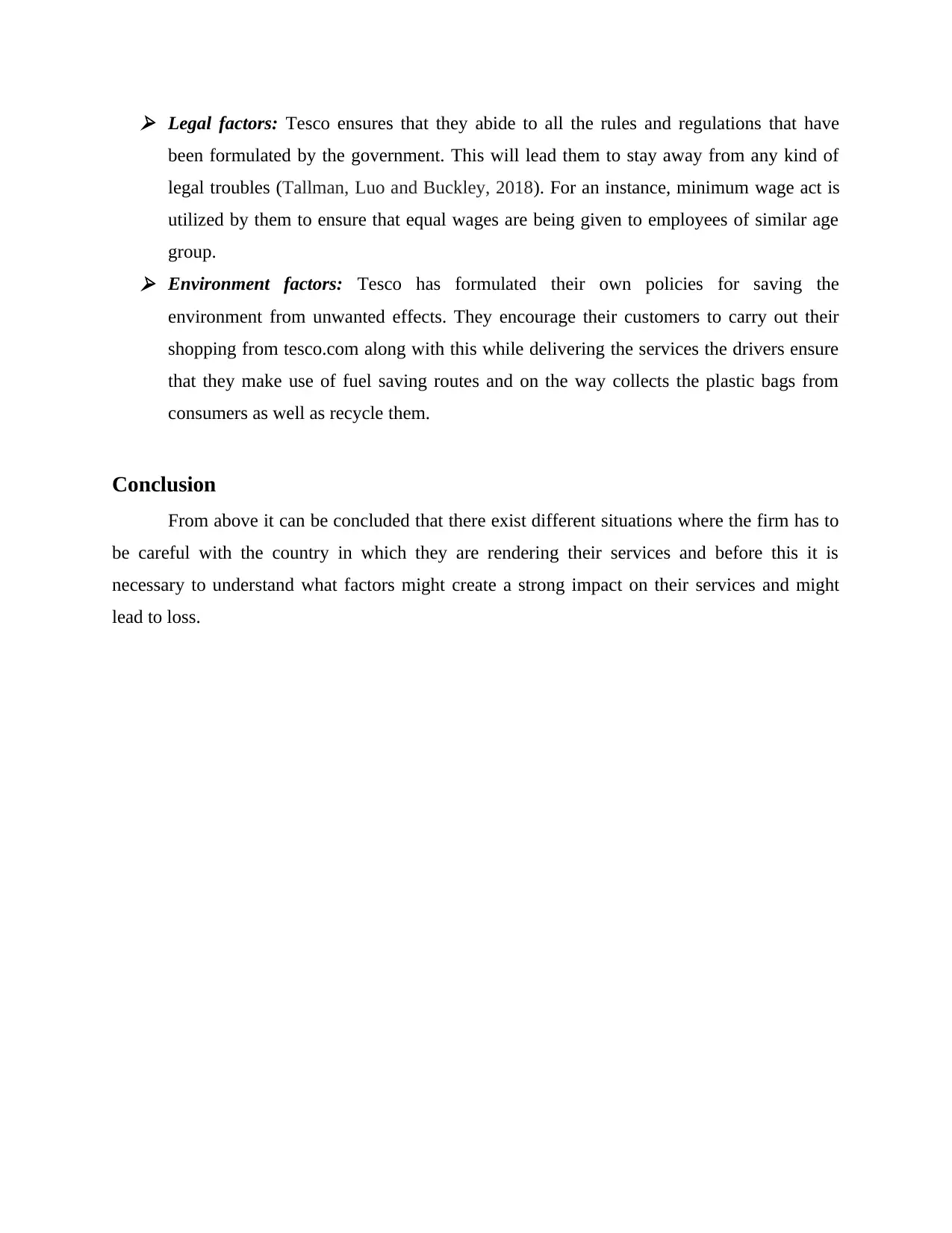
Legal factors: Tesco ensures that they abide to all the rules and regulations that have
been formulated by the government. This will lead them to stay away from any kind of
legal troubles (Tallman, Luo and Buckley, 2018). For an instance, minimum wage act is
utilized by them to ensure that equal wages are being given to employees of similar age
group. Environment factors: Tesco has formulated their own policies for saving the
environment from unwanted effects. They encourage their customers to carry out their
shopping from tesco.com along with this while delivering the services the drivers ensure
that they make use of fuel saving routes and on the way collects the plastic bags from
consumers as well as recycle them.
Conclusion
From above it can be concluded that there exist different situations where the firm has to
be careful with the country in which they are rendering their services and before this it is
necessary to understand what factors might create a strong impact on their services and might
lead to loss.
been formulated by the government. This will lead them to stay away from any kind of
legal troubles (Tallman, Luo and Buckley, 2018). For an instance, minimum wage act is
utilized by them to ensure that equal wages are being given to employees of similar age
group. Environment factors: Tesco has formulated their own policies for saving the
environment from unwanted effects. They encourage their customers to carry out their
shopping from tesco.com along with this while delivering the services the drivers ensure
that they make use of fuel saving routes and on the way collects the plastic bags from
consumers as well as recycle them.
Conclusion
From above it can be concluded that there exist different situations where the firm has to
be careful with the country in which they are rendering their services and before this it is
necessary to understand what factors might create a strong impact on their services and might
lead to loss.
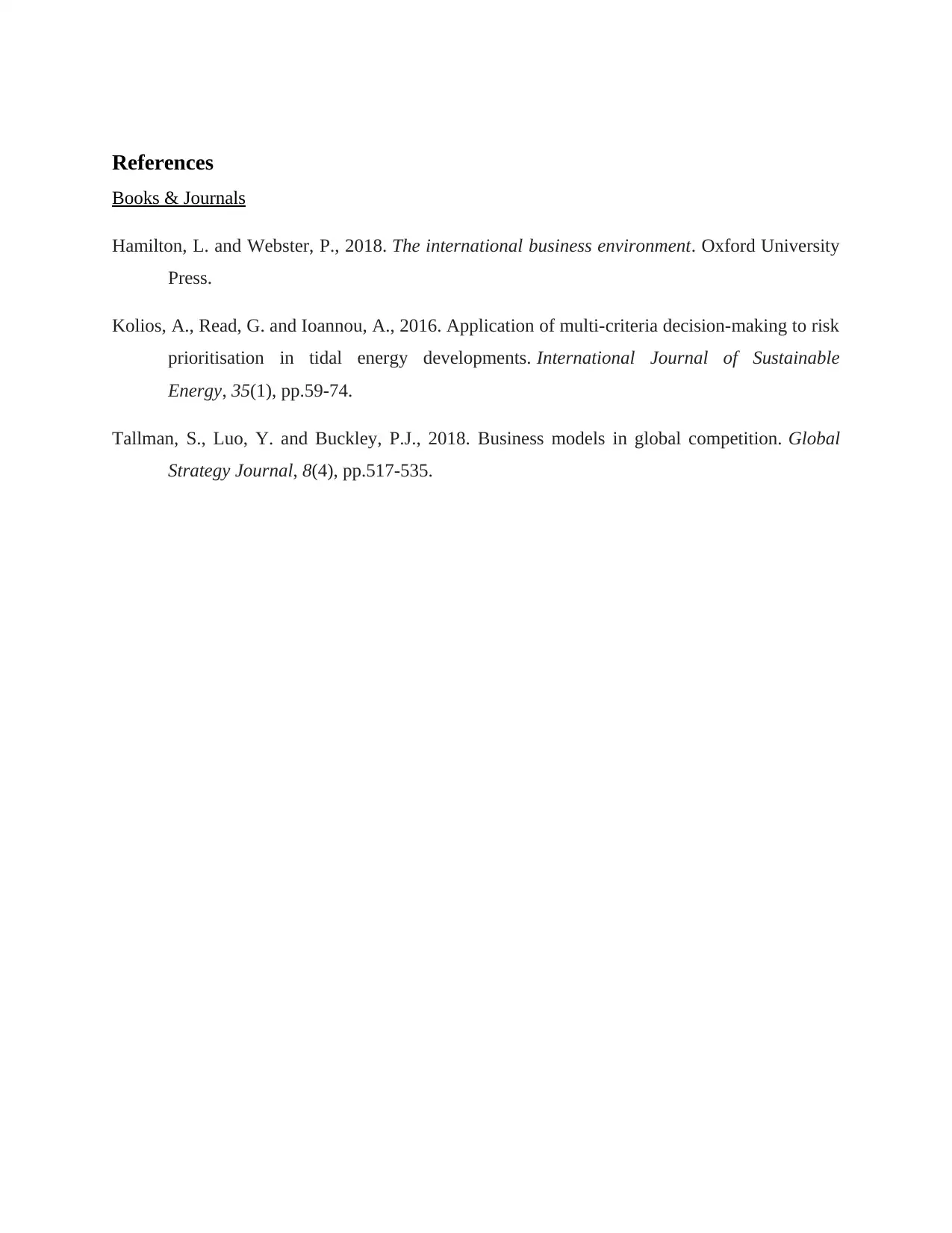
References
Books & Journals
Hamilton, L. and Webster, P., 2018. The international business environment. Oxford University
Press.
Kolios, A., Read, G. and Ioannou, A., 2016. Application of multi-criteria decision-making to risk
prioritisation in tidal energy developments. International Journal of Sustainable
Energy, 35(1), pp.59-74.
Tallman, S., Luo, Y. and Buckley, P.J., 2018. Business models in global competition. Global
Strategy Journal, 8(4), pp.517-535.
Books & Journals
Hamilton, L. and Webster, P., 2018. The international business environment. Oxford University
Press.
Kolios, A., Read, G. and Ioannou, A., 2016. Application of multi-criteria decision-making to risk
prioritisation in tidal energy developments. International Journal of Sustainable
Energy, 35(1), pp.59-74.
Tallman, S., Luo, Y. and Buckley, P.J., 2018. Business models in global competition. Global
Strategy Journal, 8(4), pp.517-535.
⊘ This is a preview!⊘
Do you want full access?
Subscribe today to unlock all pages.

Trusted by 1+ million students worldwide
1 out of 6
Related Documents
Your All-in-One AI-Powered Toolkit for Academic Success.
+13062052269
info@desklib.com
Available 24*7 on WhatsApp / Email
![[object Object]](/_next/static/media/star-bottom.7253800d.svg)
Unlock your academic potential
Copyright © 2020–2026 A2Z Services. All Rights Reserved. Developed and managed by ZUCOL.





